名词性从句(表格)
高考英语名词性从句图解法
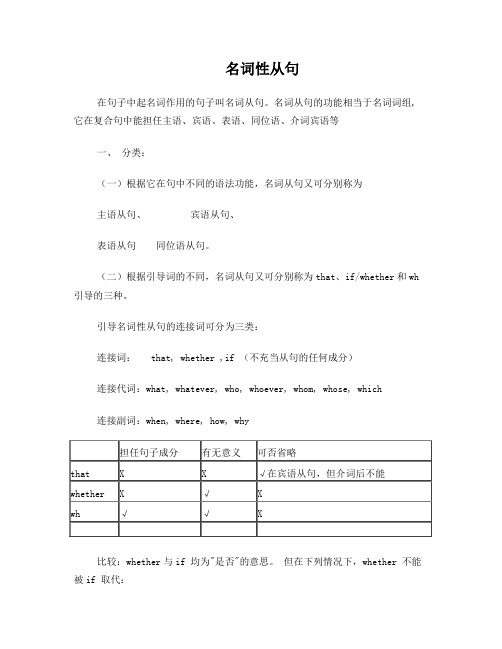
名词性从句在句子中起名词作用的句子叫名词从句。
名词从句的功能相当于名词词组, 它在复合句中能担任主语、宾语、表语、同位语、介词宾语等一、分类:(一)根据它在句中不同的语法功能,名词从句又可分别称为主语从句、宾语从句、表语从句同位语从句。
(二)根据引导词的不同,名词从句又可分别称为that、if/whether和wh 引导的三种。
引导名词性从句的连接词可分为三类:连接词: that, whether ,if (不充当从句的任何成分)连接代词:what, whatever, who, whoever, whom, whose, which连接副词:when, where, how, why比较:whether与if 均为"是否"的意思。
但在下列情况下,whether 不能被if 取代:1. whether引导主语从句并在句首2. 引导表语从句3. whether从句作介词宾语4. 从句后有"or not"二、名词性从句的句型结构图(一)wh名词性从句结构图(1)What/who+谓语+ 其他1. Who will go is not important.2. I don’t know what happened(2) What/who+主语+谓语+(宾语)1. What he said at the meeting surprised everybody present.2. Whatever he had was seized by the German soldiers.3. You may choose whoever you’d like to go with.(3) When/where/why/how主语+谓语+宾语+(状语)1. I wonder why she refused my invitation.2. That is where Lu Xun used to live.3. I don’t know when he will come.(二)主语/宾语/表语/同位语从句结构图That +从句Whether+从句Wh+从句(主语从句)to do…doing…that…(1)+ 谓语 + 其他1. That she was able to come made us very happy.2. Whether the car can be used has not been known yet.3. Whatever I have will be yours sooner or later .that +从句whether+从句wh+从句(宾语从句)to do…doing…that…(2)主语 + 谓语 +1. We knew that she was able to come2. We don’t know whether the car can be used3. You will have whatever I have4. That depends on where we shall go.that +从句whether+从句wh+从句(表语从句)to do…doing…that…5. I'm not sure why she refused their invitation.(3)主语 + is +1. The problem was that she wasn’t able to come.2. The point is whether the car can be used.(问题是…)3. The question was who could go there.that +从句whether+从句wh+从句(同位语从句)to do…doing…that…(4)名词 +1.The suggestion that the students (should) have plenty of exercise is very good.2.I have no idea whether he has passed the exam.3. I have no idea where he lives.(5)同位语从句与定语从句的区别:能还原(定语从句)that +从句名词+不能还原(同位语)1. I am glad to hear the news that he told me.(the news)2. I am glad to hear the news that I have passed the exam.三、名词性从句的特殊句式(一)That/what-从句作主语通常用it作先行词,而将that-从句置于句末。
名词性从句-完整版PPT课件精选全文

3. 连接副词:when(=the time when什么时候,何时),where(=the place where什么地方,何地),how(=the way that/in which怎样, 以……方式,如何),why=the reason why为什么)。它们除起连 接作用,还在从句中作状语。
3) wh类连接词引导的主语从句: wh类连接词包括wh类的连接代词(who, whom,
whose, which, what, whoever, whomever, whichever, whatever等)和连接副词(when,
where, how, why, whenever, wherever, however 等)。what, when和wh-ever类的词有时可不表 疑问。wh类连接代词在句中既起连接作用, 又可充当主语、宾语、表语、定语等成分。 wh类连接副词在句中起连接作用,在从句中 可充当时间、地点、原因、方式状语。
【温馨提示】 ①whether/ if引导宾语从句表示“是否”
的意思时,一般情况下可互换。 ②if引导宾语从句时可以有否定式,而
whether从句则没有。 e.g. I don’t care if he doesn’t come.
5) 特殊疑问词引导的宾语从句: 由who, what, how, which, whose, where, why等词引导的宾语从句,可作动词、 介词及形容词的宾语。
【温馨提示】 doubt, doubtful与sure后名词性从句连接词 that, whether, if的选择。 ①当doubt, doubtful用于肯定句时,后面的名
词性从句的连接词常用whether或if;当 doubt, doubtful用于否定句或疑问句时,后 面名词性从句的连接词用that。
*从句表格更新版
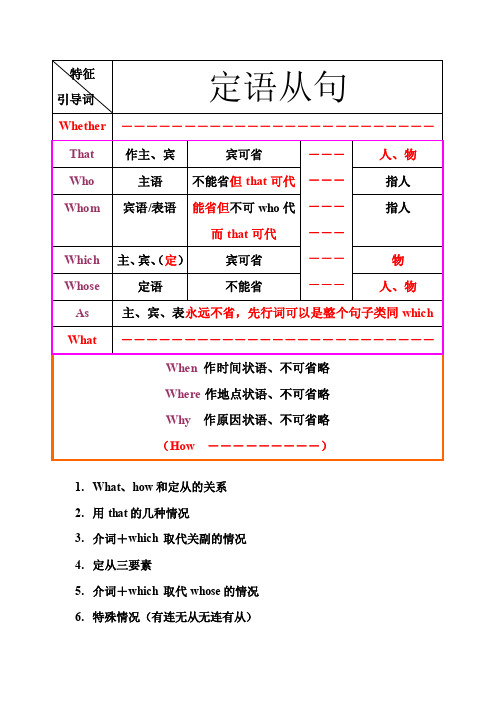
1.What、how和定从的关系2.用that的几种情况3.介词+which 取代关副的情况4.定从三要素5.介词+which 取代whose的情况6.特殊情况(有连无从无连有从)1.从句中问题多从句中解决不牵涉到主句2.从句中主谓一般不颠倒3.位置往往决定从句的种类4.名从三种引导形式:连、连代、连副5.whoever以及who所引导的从句的区别1.This is the reason why he was late2.This is the reason that/which he gave for his being late3.This is the day when the People’s Republic of China was founded4.This is the day which/that they first met on5.This is the place where they paid a visit6.This is the place that/which they paid a visit to7.This is the place which/that they visited8.This is the place which/that needs repairing in no time9.Is this the museum which/that you paid a visit to10.Is this the museum where you paid a visit11.Is this museum the one that/which you paid a visit to12.Is this museum the one where you paida visit13.This is the book ________ is redA of which coverB whose the coverC which of the coverD of which the cover 从句中动词及物与否往往决定用何种引导词。
名词性从句讲义-高三英语一轮复习

一.概念:名词性从句就相当于一个名词(因为名词可以充当主语,宾语和表语,所以名词性从句包含主语从句,宾语从句和表语从句和同位语从句)二.名词性从句主语从句That she is beautiful is a fact.主语从句系定表宾语从句We know that she is beautiful.主谓宾语从句表语从句 Our opinion is that she is beautiful.主系表语从句同位语从句The opinion that she is beautiful is a fact.主同位语从句系定表三.名词性从句的格式 1. that+陈述句=名词宾1.结构:主语 + 谓语2.语序:陈述句语序3.连接词 :①由that 引导②由if /whether 引导know if / whether Hua likes fish.③由特殊疑问词引导,表示特殊疑问意义 I want to know what time it is now.4.时态①当主句是一般现在时,从句根据情况使用任何时态。
(即:主现从不限)I don’t know (that) she is singing now.②当主句是一般过去时,从句应使用过去某时态(一般过去时,过去进行时,过去将来时,过去完成时)。
He said (that) he was at home. 他说他在家里。
③主句使用一般过去时,但从句表示的是客观真理、自然现象时、从句仍用一般现在时。
The teacher told us light travels faster than sound.一、一般结构:主语+连系动词+表语从句,二、可以接表语从句的词有:①be(being, been, am ,is, are, was, were)(be动词)② feel,look,sound, taste, smell (感官动词)③ stand, lie,remain, keep, stay(保持动词)④bee, get, grow, turn ,go ,prove(变化动词)⑤ seem, appear(表象动词)三、公式:a.由连接词that(无意义), whether(是否)引导的表语从句这时主句的主语常常是抽象名词,如problem, result, chance, suggestion, question, reason 等,表语从句对主句主语进行说明,解释等。
[名校联盟]江西省永丰中学高三英语《高考英语名词性从句表格》教案
![[名校联盟]江西省永丰中学高三英语《高考英语名词性从句表格》教案](https://img.taocdn.com/s3/m/6b2aa067b4daa58da0114a57.png)
知识要点:1、熟悉并掌握各个连接词、连接代词和连接副词的用法。
(1)It + be + 形容词+ that从句(2)It + be +名词词组+ that从句(3)It + be + 过去分词+ that从句(4)It seem, happen等不及物动词+ that从句1. _______ that caused him to serve dinner an hour later than usual.A. It was we being lateB. It was our being lateC. It was we were too lateD. It was because we were late2. If the man is only interested in your looks, _____ just shows how shallow he is.A. asB. whichC. whatD. that3. She was so angry and spoke so fast that none of us understood _______ he said meant.A. thatB. whatC. that thatD. what4. After the war, a new school building was put up ______ there had once been a theatre.A. thatB. whenC. whichD. where5. After _______ had happened, he could not continue to work there.A. whichB. howC. whatD. having6. “How was ______ they discovered the entrance to the underground palace?” “Totally by chance.”A. it thatB. he thatC. it whenD. he which7. Everyone knows that _______ is dangerous to play with fire, but _______ is difficult is to prevent children from playing with fire.A. it, itB. what, whatC. it, whatD. what, it8. He pointed to ______ looked like a tomb and said, “Ghost.”A. thatB. whatC. whichD. as9. I dislike _______ when others laugh at me in public or think poorly of me behind.A. thatB. thoseC. itD. them10. When you read the book, you’d better make a mark _____ you have any questions.A. at whichB. at whereC. the place whereD. where11. “Is ______ you want to say?” asked the teacher.A. thisB. thatC. all thatD. that all12. “When ______ leave for Japan?” “When ______ leave for Japan is kept secret.”A. they will, will theyB. will they, they willC. they will, they willD. will they, will they13. ______ is mentioned above, the number of the students in senior school is increasing.A. WhichB. AsC. ThatD. It14. ______ is mentioned above that the number of the students in senior school is increasing.A. WhichB. AsC. ThatD. It15. None knows if _______ that boy, but if _______ him, her parents will be disappointed.A. she will marry, she will marryB. she marries, she marriesC. she will marry, she marriesD. she marries, she will marry16. “Where _______ go to work?” “Where _______ go to work is not known.”A. we shall, we shallB. shall we, shall weC. shall we, we shallD. we shall, shall we17. _______ was very ______ that little Jim wrote the letter.A. It, carefulB. It, carefullyC. He, carefulD. He, carefully18. Someone is ringing the doorbell. Go and see ______.A. who is heB. who he isC. who is itD. who it is19. He was about to tell me the secret ______ someone patted him on the shoulder.A. asB. untilC. whenD. while20. Don’t you know, my dear friend, ______ it is your money not you that she loves?A. whoB. whichC. thatD. what21. It was when she was about to go to bed ______ the telephone rang.A. sinceB. asC. thatD. then22. Yesterday we visited a modern hospital, around _______ some fruit shops.A. which isB. it isC. which areD. them are23. A man with a bleed ing hand hurried in and asked, “Is there a hospital around ______ I can get some medicine for my wounded hand?”A. thatB. whichC. whereD. what24. Everyone knows, perhaps except you, _______ your girl-friend is a cheat.A. whoB. whichC. thatD. what25. The fire went on for quite some time _______ it was brought under control.A. whenB. sinceC. afterD. before26. I think, though I could be mistaken, ______ she liked me.A. whoB. whichC. thatD. what27. Just because they make more money than I do, _____ they seem to look down on me.A. soB. andC. butD. 不填28. He told me the news, believe it or not, ______ he had earned $1 000 in a single day.A. thatB. whichC. asD. because29. I’ll keep his address ________ I need it.A. so thatB. in order thatC. in caseD. when30. “Where did you find the professor who made the speech yesterday?” “It was in the hall ______ the students often have a meeting.”A. whereB. whichC. thatD. whenCorrect the mistake in each sentence1. The box is so heavy as nobody can move it.2. He will talk to us about which he saw in the US.3. That the old man’s sons wanted to know was where the gold had been hidden.4. The reason why he was late for school was because he had to send his mother to a hospital.5. I watched the way where her arms and legs moved and the funny movements made me laugh.6. When is the plane to take off has not yet been announced.7. This is the house where he visited last year.8. The film brought the hours back to me that I was taken good care of in that faraway village.9. They asked me the question if the work was worth doing.10. I don’t think he will come, do I ?。
名词性从句思维导图.docx

Which of them escaped from the prisonis still a mystery.他们哪一个是从监狱里逃跑的,仍然是个谜。
When they will comehasn’t been made pubic.他们什么时候来还不知道。
It has not been made clopened to traffic.还没弄清楚这条路将开始通车
(4)It +不及物动词+从句
It seems that …好像是……
It happened that…碰巧……
It follows that …由此可见……
Whether she is coming or notdoesn’t matter too much.她来不来都无关紧要。
(3)用关系代词引导的主语从句。
What you needis more practice.你所需要的是更多的训练。
Whoever is top fromwins the game when two matched players meet.两强相争勇者胜。
It isobviousthatconductors and insulators are both important in industry.很明显导体和绝缘体在工业中都很重要。
It is doubtful whethershe will be able to come.
她是否能来令人怀疑。
It is essential thathe should be here by the weekend .
It must be proved that…必须指出……
高三英语名词性从句表格

同位语从句说明其刖面的名词的具体内容,常用的名词如:fact,news,idea,hope,thought,order,,word,proof,belief,truth,suggestion,story,
Hedoesn'tcareifitisn't
a
whether常与ornot连用,不能用if代替。
作介词宾语要用
whether不能用if。从
句是否定句时般
特殊疑问意义
who,whom,which,whose,what,when,where,why,
Pleasetellmewhatyouwant.Shealwaysthinksofhowshecanworkwell.
WheretheEnglisheveningwillbeheldhasnotyetbeenannounced.
把它移到句子后面,前面用引导词it来作形式主语。
2、宾语从句:
关联词
例句
说明
陈述意义
that
Ibelieve(that)heishonest.
Wemustneverthink(that)wearegoodineverythingwhileothersaregoodinnothing.
等引导,以示疑
Theproblemis(that)theycan
eeaget
he在非正式的文体中that可以省去。
连接代词
whowhatwhich
enThOp.sjustwhatIwant.
Thequestioniswho(whichofyou)willbethenextspeaker.
(完整版)名词性从句表格

缺主语缺宾语缺定语时间地点方式原因人:who人:who/whom物:what 物:what备注表语从句人:who 人:who/whom (系动词后)物:what 物:what备注同位语从句人:who/whom (the news等)物:what备注宾语从句人:who人:who/whom(动词or介词后)物:what 物:what 备注⒈主语从句中不缺任何成分时,That不能省.⒉主语从句中只能用Whether.⒊主语从句中可用It代替主语.⒉The reason why…is/was that ⒊表语从句中不能用If.只能用as if.HowWhy⒈…that if/that what ⒉可以隔开不填WhenWhereWhere How 主语从句WhichWhenWhereHow⒈ I assare you that… 我向你保证 I inform you that… 我告诉你…⒉ 主语+谓语+it+(adj)+that+宾语从句⒊ 宾语从句中,用陈述句语序WhyWhy⒈It is becauseWhich When 不填⒊当有解释为"建议,要求,命令"时,要用虚拟WhichWhenWhereHowWhy除:What's wrong with you? What's the matter with you?定语人:who/that 人:who/whom/that 物:that/which物:that/which/不填of which in which in which by which for whichof whomon which on which at whichat which备注:状语从句when whenever while as before after till until since as soon asevery timeby the timethe moment..状语从句becauseas since⒊ situation / case / envionment / condition + Where What's the trouble with you?⒈ the way in which / the way that / the way 不填⒋ doubt 用法: sb.doubt + WH- sb don't doubt + that sb never doubt + that point when / point where ⒋ during which time. 在…期间 by which time. 到…时间为止Do sb.doubt … + thatWhose When Where howwhy⒉ the same… as 和 the same… that区别 such ...as和such...that区别连接词hardly...whenn o sooner…than时间状语从句地点状语从句 where wherever anywhere everywhere连接词for fear thatconsidering that原因状语从句seeing that in case now that..结果状语从句that so(that)such that目的状语从句so so that lest in caseif unless supposing given(that)though although if while whateverwherever however whenever whoever方式状语从句as..as not so/as..asthanin order that 条件状语从句in case/on condition (that)so (as) long as ..原因状语从句比较状语从句the same as such…as the more…the more even though/if in spite of 让步状语从句 as as if/though。
名词性从句完整版

语法讲练名词性从句㈠名词性从句的种类⒈主语从句(在主句中作主语)Who will win the game is not known.⒉宾语从句(在主句中作宾语)Nobody knows who will win the game.⒊表语从句(在主句中作表语)My question is who will win the game.⒋同位语从句(在主句中作同位语)I have no idea who will win the game.1. What worries me most is the coming exam.2. I don’t know whether /if I can pass it .3. The fact is that I don’t do well in English.4. But I hold the belief that you’ll succeed as long as you work hard.主语从句宾语从句表语从句同位语从句㈡ 名词性从句的连接词连接词即引导名词性从句的关联词,包括: 连词:仅起连接作用,不作句子成分。
连接代词:可作主语、宾语、表语或定语。
连接副词:只作状语。
连接副词: when , where, why, how从属连词:that , if, whether ,as if ,because连接代词:who, whom, which, whose, what, whoever, whomever, whatever, whichever1. 主语从句: 句子在复合句中充当主语结构类型: ①由That / Whether引导; ②由wh-疑问词和How引导; ③由It作形式主语(主语较长时)It is a pity that you missed the film. What he needs is more experience.It is said that there will be a party tonight.2. 宾语从句:连接词:结构:从句作及物动词或介词的宾语。
名词性从句思维导图高中
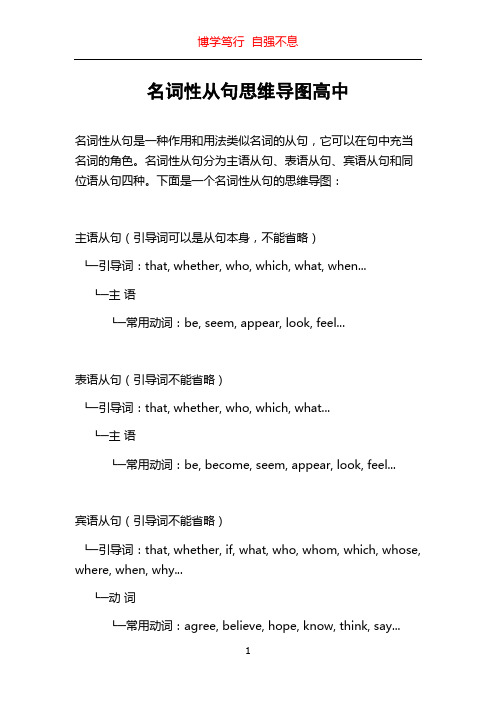
名词性从句思维导图高中
名词性从句是一种作用和用法类似名词的从句,它可以在句中充当名词的角色。
名词性从句分为主语从句、表语从句、宾语从句和同位语从句四种。
下面是一个名词性从句的思维导图:
主语从句(引导词可以是从句本身,不能省略)
└─引导词:that, whether, who, which, what, when...
└─主语
└─常用动词:be, seem, appear, look, feel...
表语从句(引导词不能省略)
└─引导词:that, whether, who, which, what...
└─主语
└─常用动词:be, become, seem, appear, look, feel...
宾语从句(引导词不能省略)
└─引导词:that, whether, if, what, who, whom, which, whose, where, when, why...
└─动词
└─常用动词:agree, believe, hope, know, think, say...
同位语从句(引导词不能省略)
└─引导词:that
└─名词
└─常用名词:idea, fact, news, belief, hope, suggestion...
在使用名词性从句时,需要注意引导词的不同,以及从句的位置要根据具体语境来确定。
同时,还需要了解一些常用的谓语动词和名词,它们通常与名词性从句搭配使用。
名词性从句思维导图(精选.)

1.宾语从句一般用陈述语气,但是,当主句的谓语动词为advise, insist(坚决主张), suggest(建议), require, request, order, ask(要求)等表示请求、命令、要求、主张意义的动词时,从句谓语要用虚拟语气,即用“should+动词原形”(should往往可以省略)。
Eg. “Where are the tickets?” I asked him.
→I asked himwhere the tickets are.
三、时态呼应。
如果主句谓语是一般现在时或将来时,从句谓语的时态不受限制;
如果主句谓语的时态是一般过去时,从句一般要随着改为相应的过去时态(一般过去时、过去进行时、过去将来时、过去完成时)
I wishI were a bird.我希望我是一只鸟。
I wishwe lived on the moon now.我希望我们现在住在月亮上。
五、注意宾语从句的否定问题
当否定宾语从句时,一般直接对从句的谓语动词进行否定。
I know thathe won’t tell a lie to us.我知道他不会对我们说谎。
It must be proved that…必须指出……
类似的过去分词还有:known; estimated; expected; believed; thought; hoped; noted; discussed; required; decided; suggested; demanded; made clear; found out,etc.
eg. I thought(that)you are free today.(╳)
I thought(that)you would be free today.(√)
高考英语名词性从句表格
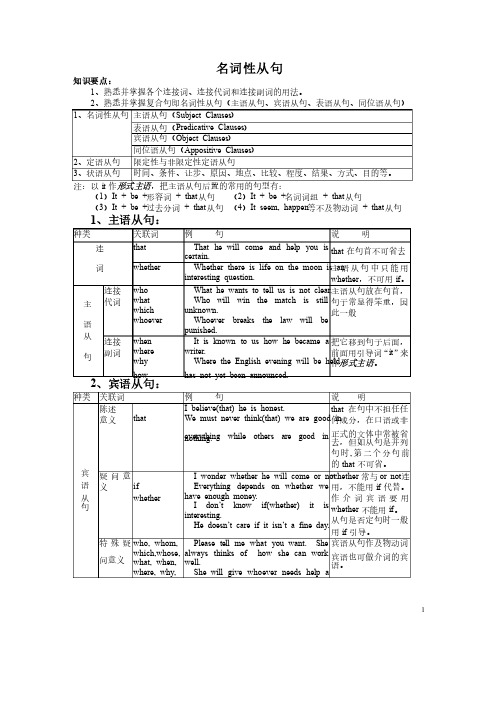
1 名词性从句知识要点:1、熟悉并掌握各个连接词、连接代词和连接副词的用法。
2、熟悉并掌握复合句即名词性从句(主语从句、宾语从句、表语从句、同位语从句) 1、名词性从句、名词性从句 主语从句(Subject Clauses )表语从句(Predicative Clauses )宾语从句(Object Clauses )同位语从句(Appositive Clauses )2、定语从句、定语从句 限定性与非限定性定语从句限定性与非限定性定语从句3、状语从句、状语从句 时间、条件、让步、原因、地点、比较、程度、结果、方式、目的等。
注:以it 作形式主语,把主语从句后置的常用的句型有:,把主语从句后置的常用的句型有:(1)It + be + 形容词形容词 + that 从句从句 (2)It + be + 名词词组名词词组 + that 从句从句 (3)It + be + 过去分词过去分词 + that 从句从句 (4)It seem, happen 等不及物动词等不及物动词 + that 从句从句 1、主语从句:种类种类 关联词关联词 例 句 说 明 连 词 that That he he will will come and help you is certain. that 在句首不可省去在句首不可省去 whether Whether there is life on the moon is an interesting question. 主语从句中只能用whether ,不可用if 。
主 语 从 句 连接连接 代词代词 who what which whoever What he wants to tell us is not clear. Who will win the match is still unknown. Whoever breaks the law will be punished. 主语从句放在句首,句子常显得笨重,因此一般此一般连接连接 副词副词 when where why how It It is is is known known to to us us us how how how he he he became became a writer. Where the English evening will be held has not yet been announced. 把它移到句子后面,前面用引导词“it ”来作形式主语。
(完整版)名词性从句思维导图
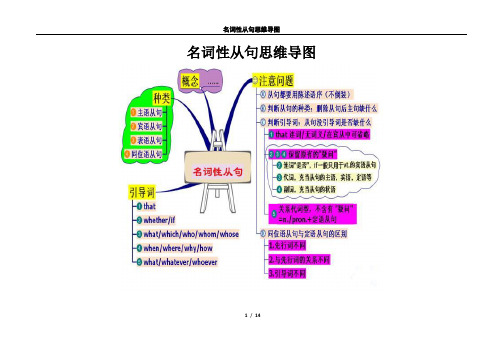
类似的不及物动词还有:seem, appear, occur, follow, happen, turn out, etc.
It turned out thatnobody remembered the address.
结果是无人记得那个地址。
It must be proved that…必须指出……
类似的过去分词还有:known; estimated; expected; believed; thought; hoped; noted; discussed; required; decided; suggested; demanded; made clear; found out,etc.
eg. I thought(that)you are free today.(╳)
I thought(that)you would be free today.(√)
【注意】当宾语从句叙述的是客观真理时,不管主句谓语的时态如何,从句都用一般现在时。eg.The teacher told us(that)the earth moves around the sun.
Whether she is coming or notdoesn’t matter too much.她来不来都无关紧要。
(3)用关系代词引导的主语从句。
What you needis more practice.你所需要的是更多的训练。
Whoever is top fromwins the game when two matched players meet.两强相争勇者胜。
It is thought thathe is the best player.大家都认为他是最好的选手。
最新名词性从句引导词表格

一、名词性从句的引导词:(一)常见的酸和碱1、酸的通性(1)酸溶液能跟酸碱指示剂起反应。
紫色石蕊试液遇酸变红,无色酚酞试液遇酸不变色。
注意显色的物质是指示剂。
(2)酸能跟多种活泼金属起反应,通常生成盐和氢气。
只有位于金属活动性顺序表中氢前面的金属才能与稀酸(HCl、H2SO4)反应,产生氢气。
位于氢后的金属不能与稀酸(HCl、H2SO4)反应,但能与浓硫酸和浓硝酸反应。
例如:①Cu+2H2SO4(浓) CuSO4+SO2↑+2H2O②3Cu+8HNO3(稀)=3Cu(NO3)2+2NO↑+4H2O可见,金属和浓硫酸、硝酸反应都没有氢气产生,这就是实验室不能用浓硫酸和硝酸与锌反应制氢气的原因。
(3)酸能跟碱性氧化物反应生成盐和水:H2SO4 + CaO == CaSO4 + H2O(4)酸能跟某些盐反应生成新酸和新盐:H2SO4 + BaCl2 === BaSO4↓+ 2HCl(5)酸跟碱起中和反应生成盐和水:H2SO4+Ba(OH)2 === BaSO4↓(白色沉淀)+2H2O常见的酸有盐酸、硫酸和硝酸,它们虽然具有上述五点通性(因为电离出的阳离子都是H+)。
但又各具不同的物理化学性质。
①盐酸是氯化氢的水溶液,是一种混合物。
纯净的盐酸是无色的液体,有刺激性气味。
工业品浓盐酸因含有杂质(Fe3+)带有黄色。
浓盐酸具有挥发性,打开浓盐酸的瓶盖在瓶口立即产生白色酸雾。
这是因为从浓盐酸中挥发出来的氯化氢气体跟空气中水蒸汽接触,形成盐酸小液滴分散在空气中形成酸雾。
②硫酸是一种含氧酸,对应的酸酐是SO3(SO3+H2O==H2SO4)。
纯净的硫酸是没有颜色、粘稠、油状的液体,不易挥发。
常用的浓硫酸中的H2SO4的质量分数为98%,密度为1.84克/厘米3。
稀H2SO4具有酸的通性。
浓硫酸除去具有酸的通性外,还具有三大特性:a、吸水性:浓H2SO4吸收水形成水合硫酸分子(H2SO4•nH2O),并放出大量热,所以浓硫酸通常用作干燥剂。
名词性从句(表格)

1.从句的判定(定义、位置、作用)
2.连接词的选用如:that / what; that / whether (if); whether / if; who/ whoever; which / what; how/what; no matter wh-/ wh-ever
3.从句的语序(顺装)与主语从句后主句的谓语动词的数。
2. depend on / upon
rely on/ uponit+ that-clause.
see to
3. appreciate it if you …
4. hate/ (dis)like/love it when –clause.
5.否定前移
(think, believe, suppose, fancy, expect, guess, etc)
4.主从句时态的一致性。5.典型句型。6.定语从句与同位语从句的区别。
5.名词性从句与虚拟语气。
when, where, why, how, how(much, many, soon, often, long, far, etc)
when, where, why, how, how(much, many, soon, often, long, far, etc)
典型句型
1.It be + adj. + that –clause.
suggested/ordered/advised/decided/arranged, etc.)
4.It seems /appears/turns out/ happens / etc. + that-clause.
5. doesn’t matter (matters much)
名词性从句思维导图

名词性从句思维导图名词性从句思维导图表⼀:主语从句表⼀:主语从句表⼀:主语从句(1)由连词that引导的主语从句。
Thatyouwillwinthe medalseemsunlikely.你想获得奖牌看起来是不可能的。
Thatshesurvivedtheaccidentisamiracle.她在事故中幸免于难简直是奇迹(2)⽤连接代词或/s?wd=%E8%BF%9E%E6%8E%A5%E5%89%AF%E8%AF%8D&hl_tag=textlink&tn=SE_hldp01350_v6v6zkg6连接副词或whether引导的主语从句。
Whichofthemescapedfromtheprisonisstillamystery.他们哪⼀个是从监狱⾥逃跑的,仍然是个谜。
Whentheywillcomehasn’tbeenmadepubic.他们什么时候来还不知道。
Whethersheiscomingornotdoesn’tmattertoomuch.她来不来都⽆关紧要。
(3)⽤关系代词引导的主语从句。
What youneedismorepractice.你所需要的是更多的训练。
Whoeveristopfromwins thegamewhentwomatchedplayersmeet.两强相争勇者胜。
Whateverwedoistoservethepeople.我们⽆论做什么都是为⼈民服务。
固定⽤法和译法固定⽤法和译法(1)Itis+名词+从句Itisafactthat…事实是……Itisgoodnewsthat………是好消息Itisaquestionthat………是个问题Itiscommonknowledgethat………是常识类似的名词还有:apity;awonder;agoodthing;nowonder;surprise等。
Itisamysterytomehowitallhappened.这⼀切是怎么发⽣的是个谜。
- 1、下载文档前请自行甄别文档内容的完整性,平台不提供额外的编辑、内容补充、找答案等附加服务。
- 2、"仅部分预览"的文档,不可在线预览部分如存在完整性等问题,可反馈申请退款(可完整预览的文档不适用该条件!)。
- 3、如文档侵犯您的权益,请联系客服反馈,我们会尽快为您处理(人工客服工作时间:9:00-18:30)。
when, where, why, how, how(much, many, soon, often, long, far, etc)
典 型 句 型
1. It be + adj. + that–clause.
= That’s the reason why + clause.
the way that
in which
/
2. The reason why–clause is + that-clause.
3.Thefact / truth / etc. is + that-clause.
-
4. It seems as if-clause.
高考侧重点:
1.从句的判定(定义、位置、作用)
2.连接词的选用 如:that / what; that / whether (if); whether / if; who/ whoever; which / what; how/what; no matter wh-/ wh-ever
3.从句的语序(顺装)与主语从句后主句的谓语动词的数。
that / whether (if) +整句;
连接代词/副词+从句剩余成分
that / whether +整句;
连接代词/副词+从句剩余成分
关 联 词
从属连词
that / whether
`
that/ whether;
as if / as though/ because
that / whether / if
4.Word/The news/The ordercamethat-clause.
leave sb.word
5.同位语从句前常见名词有:thought, question, doubt, problem, news, word, message, conclusion, report, fear, proposal, idea, plan, arrangement, etc.
6. 介词宾语从句不可用which, if引导。that只可引导在in/but/except/ besides后的宾语从句
1.Ihave no idea wh-clause.
2.Ihave no doubt/ question + that-clause.
3.Ihave some doubts / a question + wh-clause.
(obvious/clear/true/certain/good/wonderful/funny/possible/probable/likely;
necessary/natural/surprising/admirable/desirable/amazing,etc)
2.It be + n. + that-clause.
主语从句
表语从句
宾语从句
同位语从句
定义/位置
~ + V
It + V + ~
be / appear / seem / + ~
Vt./ prep. / adj. + ~
n. + ~
…
构成
that / whether +整句;
连接代词/副词+从句剩余成分
that / whether/as if / as though /because+整句; 连接代词/副词+从句剩余成分
(no wonder/anhonor/agood thing/a pity/no surprise/common knowledge, etc.)
3.}
4.It be + 过去分词 + that-clause.
(said/reported/thought/expected/announced/hoped;
4.主从句时态的一致性。5.典型句型。6.定语从句与同位语从句的区别。
5.名词性从句与虚拟语气。
suggested/ordered/advised/decided/arranged, etc.)
5.It seems /appears/turns out/ happens / etc. + that-clause.
6.doesn’t matter (matters much)
makes no difference
2. depend on / upon
rely on/ uponit+ that-clause.
—
see to
3. appreciate it if you…
4. hate/ (dis)like/loveit when–clause.
5. 否定前移
(think, believe, suppose,fancy,expect,guess,etc)
It makes a big difference+ wh- / that-clause
makes (no) sense
etc.
6.It remains to be seen whether–C.
1. That’s where
\
when
why + clause.
how
the place where
that’s the time when
Sb. looks as if-clause.
5. That’s why–C. cf: That’s because–C.
1. think
find
sb. feel it + n./a. + that-clause.
consider
make
take it for granted + that-clause.
who,whom, which, what, whose
:
连接副词
when, where, why, how, how(much, many, soon, often, long, far, etc)
when, where, why, hten, long, far, etc)
that / whether
连接代词
who(ever),whom(ever), which(ever), what(ever), whose(ver)
who,whom, which, what, whose
who(ever),whom(ever), which(ever), what(ever), whose(ver)
